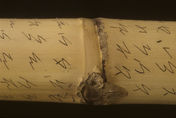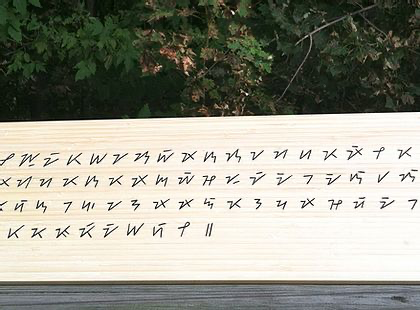
WORKS
 AMBAHANa metaphoric poem comprising seven-syllable lines |  BAMBOO AMBAHANfirst in a notebook, then on traditionally used bamboo tubes. |
|---|
AMBAHAN
The ambahan is the traditional poetry of the Hanunuo Mangyans of Oriental Mindoro. It is usually written on bamboo in the Surat Mangyan, a centuries-old pre-Spanish script. The syllabic script and the ambahan poetry have complemented each other, contributing to their continued existence today.
Ambahan is a literary product and poetic expression of the Southern Mangyans of Mindoro, Philippines. Although there are about seven different ethnic groups living in Mindoro, collectively called the Mangyans, these groups are quite distinct from each other as to language, customs, and way of living. Only the ethnic group living in the south of Mindoro, roughly comprising the areas within the municipalities of Bulalacao (San Pedro), Mansalay, Oriental Mindoro, and San Jose, Occidental Mindoro, claims the name Mangyan as the descriptive title of their tribe. To stress their point, they might add the epithet: "Hanunuo" Mangyan, that is, a "truly, real, genuine" Manygan.
Ambahan can also be stated as:
a) A rhythmic poetic expression with a meter of seven-syllable lines and having rhythmic end-syllables.
b) It is most often presented as a chant without a determined musical pitch or accompaniment by musical instruments.
c) Its purpose is to express in an allegorical way, liberally using poetic language, certain situations, or certain characteristics referred to by the one reciting the poem.
Like all poetry, the ambahan is an expression of an idea or feeling in a beautiful and harmonious language. Unlike other forms of poetry, however, the ambahan is not poetry for its own sake or for the poet's satisfaction. The ambahan is primarily a poem of social character; it finds its true existence in society. It is created by the Mangyans to serve practical purposes within the community. It is used by the parents in educating their children, by young people in courting each other, by a visitor is asking for food, and by a relative bidding goodbye or farewell. Of course, it would be a mistake to think that the Mangyans converse with each other only by the ambahan. If a man comes from his field, he will not use an ambahan to tell his wife that he is hungry; he will express the feeling of his stomach in plain and clear language. Nevertheless, the ambahan is used on those occasions






